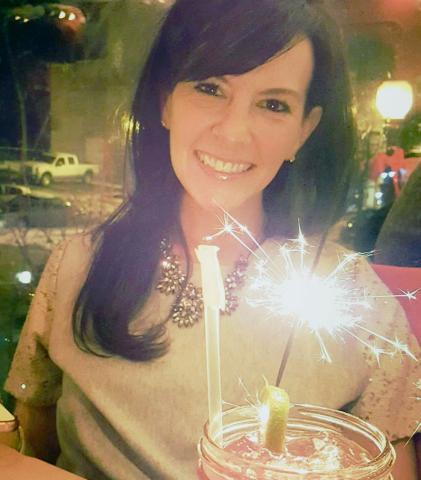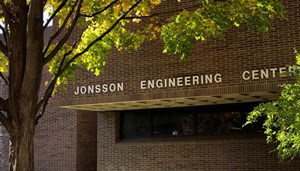
From the Machine Shop to Saving Lives
1. Tell us a bit about yourself:
I was born at Samaritan Hospital, attended Troy Middle and High School, and then went to Rensselaer for college! So, I am a true Troy Trojan; it’s in my blood, and RPI is too! My Dad (Sam Chiappone) is the director of manufacturing innovation at RPI, and has been employed there for almost 40 years. I remember many a snow day as a kid going in to work with him for the day, all the RPI hockey games, the Big Red Freakouts, and bring-your-daughter-to-work days. My favorite part about going to work with him was always coming home with something we would make together or the students would give me; whether it was from an injection molding machine or a laser cutter, there was always something new and “cool” to do or see in the lab or machine shops. He exposed me to so much technology at such a young age without me even realizing, then, how much it would shape my future.
I graduated in 2005 from the Product Design and Innovation program with a dual degree in mechanical engineering and humanities (science and technology studies).
2. What led you to pursue an engineering degree?
I really enjoyed science and math growing up. I loved creation and innovation and had a thirst for learning and challenging myself. Throughout elementary school, I was enrolled in a program called “Saturday Scholars.” We would build robots and do science experiments. In high school I attended the Preface program which exposed me to advanced manufacturing and engineering, and the Entreprep Summer Program which exposed me to entrepreneurship through an internship at the RPI Incubator Center. As a senior in high school, I shadowed female students in the Product Design and Innovation Program. I also took physics at RPI through a collaborative program with Troy High for college credit. I also snuck away from Troy High from time to time with friends to grab an ice cream at Ben & Jerry’s in the Student Union! I have so much gratitude for RPI’s involvement in the community, and their student outreach programs that promote technology and learning to students at a young, impressionable age.
3. What was your Rensselaer experience like? What do you think distinguishes Rensselaer?
Graduating from RPI was one of my most challenging and fulfilling accomplishments. I think what distinguishes Rensselaer is the cutting-edge technologies, hands-on learning opportunities, and the exposure to real-world applications through our coursework. Additionally, the corporate sponsorships of our capstone projects expose us to projects that impact organizations’ high-priority goals and objectives. I truly feel like RPI prepares its students to become leaders in the real world.
4. Is there a specific memory from your RPI days that you wish to share?
For me, RPI was about the total experience. All-nighters in the Folsom Library where I headed directly to my exam the next morning praying for a “curve,” hours and hours on the lathes in the shop machining the iconic “RPI canon” in Engineering Processes, building a microcontroller board and programming our LITEC smart cars to follow an optical path, baseball, football, and hockey games, and getting involved in the fun of GM Week all stand out in my memory!
But I think the bulk of my memories come from my Greek Life days at Pi Beta Phi. It was the most fulfilling experience in terms of friendship, development of intellect and integrity, cultivating leadership potential, and enriching lives through community service in Troy. We formed some truly unbreakable bonds. I am so proud to know these distinguished women who are changing the world just like RPI intended for us to.
5. Did Rensselaer education prepare you for a successful career? How did your dual degree in PDI complement your engineering degree?
Yes, for sure! It prepared me to be a leader, as well as a value-added team member. One of the greatest takeaways from my undergraduate experience was learning how to use logic and to problem-solve in any circumstance. It prepared me to think outside of the box and be more strategic. For me, my PDI degree really complemented both my engineering degree and my MBA, when I moved into a product manager role. I was able to take products from concept through commercialization and work closely with R&D on human factors engineering and design validation and verification by gathering voice of customer from our end users. I was constantly thinking about design methodology, the larger picture, and how these products would impact not only our customers, but society as a whole.
6. Tell us about your career path/journey? What do you do?
I began my career in the medical device industry with Becton Dickinson (BD) in their Manufacturing Development Program. After my leadership development program ended, I took a permanent position at BD Ophthalmic Systems division in Boston (which became Beaver-Visitec, International). BVI is an ophthalmic device manufacturer of single use instruments and surgical procedure packs. There I became a certified LEAN and Six Sigma Black Belt, as well as Design for Six Sigma, and eventually Quality Engineering Manager. During this time, I graduated with my MBA from Northeastern University with a minor in marketing and eventually transitioned into a product manager role.
In the product manager role I worked closely with R&D to translate user needs into industry-leading surgical products from concept through commercialization. This job entailed about 50% travel, so I was globetrotting to meet with surgeons to understand customer requirements that oftentimes varied by country, and gathering voice of customer on surgical prototypes, training surgeons on laser ophthalmic surgical devices in wet labs, and working alongside engineers on design validation/verification activities.
After a 12-year career at BD, I made the decision to move back to New York to be closer to my family. I am now employed at Regeneron Pharmaceuticals in Troy, in the Industrial Operations and Product Supply division. We manufacture a range of biopharmaceuticals for patients worldwide. I have made my way back to operations and manufacturing and am now a manager of quality assurance.
7. What keeps you busy/excited/active in your position?
For me, it has always been the industry, medical device and pharma, and knowing that my work has a greater good in helping people live healthier lives, and sometimes even saving lives! I have had family members who have benefited directly from products I have helped bring to market. Seeing firsthand the benefits of these products, and the impact they have had for people who are close to me, is extremely fulfilling.
Currently, Regeneron has been in the news regarding our breakthrough drug that is saving lives in the Democratic Republic of Congo, where they are experiencing a traumatic outbreak of Ebola. I am so proud to be a part of a team that is delivering a medical breakthrough to patients and saving lives.
8. Rensselaer Engineering recently crossed a major milestone — 1,100 women (>30%) enrolled in Engineering! How are women engineers and scientists contributing in your field?
Wow that’s great! I think when I was enrolled, the ratio was about 5:1. It’s funny, and a lot of my girlfriends and female colleagues don’t agree with what I am about to say, but I don’t really focus on the gender gap of being a female engineer. I’ve never really used it to define me. To me, I am an engineer, period. I think engineering in general comes with many challenges, male or female. I was raised to be strong and confident and have a voice, and I have always used data to back up my positions. At Regeneron, we have a group called WISER, Women in Science and Engineering at Regeneron, that meets monthly on various topics and is meant to be an opportunity to network with other female professionals. In general, in this growing industry, it’s easier to unite women than ever before with the power of social media.
Challenges as a woman in an engineering profession? I think for me right now, it’s learning how to balance personal life and my profession. I am a working, first-time mom who is learning the delicate balance of my career and my family. I am trying to embrace the power of confidently setting boundaries, pushing back, and removing inefficiencies from my day, but it’s a learned skill set for sure!
9. What do you do for fun? Hobbies? Favorite books, blogs, podcasts? Travel destinations?
I love yoga. I have an interest in all things health-related; the science of nutrition and using food as medicine, and farm-to-table practices. I also love to travel. I have traveled all over the states, Europe, and even India. Family and friend time is also so important to me. My husband and I welcomed our first child into the world ten months ago, a baby boy named Caleb. We are soaking up the journey of becoming new parents and truly enjoying every moment. We also have a goofy and loveable 100-pound chocolate English lab named Hank.
As to favorite books and podcasts, right now I’d have to say, Goodnight Moon, ha, but I am also reading Michelle Obama’s autobiography, Becoming, if I can keep my eyes open after the baby goes to bed! For podcasts, I have always really been into NPR’s This American Life and Hidden Brain.
10. What is your message to current Rensselaer students? To women engineers and scientists?
I think all of us RPI students tend to be perfectionists by nature…[yet] our greatest innovations and self-development flourish in the “less than perfect” outcome. As engineers we feel most comfortable with the theoretically perfect black and white scenario and the data to put a box around our final answer. In real life, this isn’t practical. Be comfortable with the imperfect, and with the gray areas. This is where my greatest learning has happened.
As you grow your career, if you are in a role where you have the opportunity to “go to the gemba,” i.e., the shop floor, the clean room, the assembly line, get out there and roll up your sleeves. The more you immerse yourself in the action, alongside the real subject matter experts, with a willingness to learn and grow, the more people will respect you.
To women engineers and scientists: Women have been changing the world for ages, Emily Warren Roebling, Marie Curie, and Sally Ride, to name a few. I think it is important to share our successes and challenges with the next female generation of leaders. The more we openly share and influence, the better chance we have at keeping women on the forefront of technological advances. Whether it is through mentoring programs, or just around the dinner table, exposing young girls to STEM and industry will keep their young fires burning and evoke curiosity.
In your own professional journey, find yourself a mentor, someone you trust and look up to, who has traveled some of the roads that may be on your journey, someone who knows when to give advice, but also when to just sit back and listen. Networking is important too. Become a member of the Society of Women Engineers or something that will expose you to other women in your industry. This is beneficial for developing a professional network, finding a mentor, or making some new friends who can be a part of your support system.
